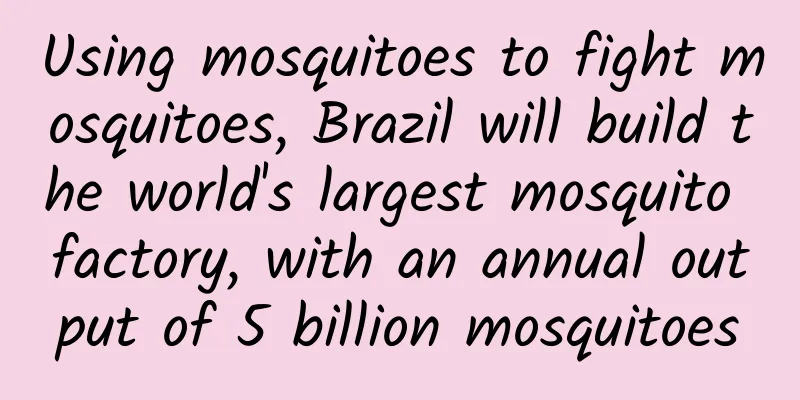Using mosquitoes to fight mosquitoes, Brazil will build the world's largest mosquito factory, with an annual output of 5 billion mosquitoes

|
Summer is almost here, and along with sunshine, beaches, and ice cream comes… mosquitoes! The crimes of mosquitoes are too numerous to list: standing outside for a while, you will get a big red and itchy bump on your leg; as soon as you wake up at night, they start buzzing around your ears, but you can't find them even if you turn on the light; What’s even more frightening is that mosquitoes can also spread diseases such as dengue fever, Zika, and malaria, causing hundreds of millions of people to suffer from illness every year. It penetrates everywhere! Image source: Internet Brazil is fed up with dengue fever caused by mosquitoes, so it decided to use a big move - they plan to build a factory that can produce special mosquitoes. These mosquitoes contain a kind of bacteria that not only makes them lose the ability to carry dengue virus, but also makes normal mosquitoes "infertile" when released into the wild. It is said that this factory can produce 5 billion mosquitoes a year! But before we reveal the secrets of this factory, let's first understand how mosquitoes transmit diseases to humans. A basic fact is that only female mosquitoes bite people because they need to suck blood proteins to lay eggs. The reason why mosquitoes can spread diseases so efficiently is because of their "blood-sucking weapon", that is, their mouth. Image credit: Lizzie Harper At first glance, the mosquito's mouthparts look ordinary, just a "small stick", but under a microscope, we can find that there is something else. The mosquito's mouthparts are actually composed of 6 "micro needles". When biting, two needles called maxillae are first deployed , with tiny teeth at the end, responsible for sawing the skin. However, because these teeth are sharp and small, we hardly feel anything. Then, the other two needles called mandibles start to work , which are responsible for opening the cut skin tissue so that the mosquito mouth can continue to penetrate deeper. The mosquito's mouthparts can easily pierce the skin. Image source: deeplook The fifth needle is called the labrum, which has many receptors at the end that react to chemicals in the blood. Under a microscope, the mosquito's labrum is like a flexible little bug that constantly moves in our skin to find blood vessels. Once it successfully finds a blood vessel, the labrum turns into a straw and sucks blood into the body. Look for blood vessels on the upper lip. Image source: deeplook The sixth needle is called the hypopharynx, and its function is to release mosquito saliva at the place where the blood is sucked . Mosquito saliva contains antithrombin, which ensures that our blood does not coagulate, but its saliva can also trigger allergic reactions, which is why we get swollen and itchy after being bitten by mosquitoes. What's scary is that when mosquitoes release saliva, viruses, bacteria and parasites will also enter the human body through the "tongue needle" and then cause diseases such as dengue fever, malaria and yellow fever. A mosquito full of blood. Image source: Wiki Commons After understanding the specific process of mosquito-transmitted diseases, we can roughly come up with three response strategies: 1. Kill mosquitoes directly; 2. Eliminate the viruses carried by mosquitoes; 3. Make moves on the mosquitoes' mouthparts, such as destroying the blood detection receptors on the upper lip so that they cannot find the location of blood vessels. Brazil's current response combines approaches 1 and 2—a strategy adopted by many countries. Back to the mosquito factory. The reason why we call the mosquitoes here special mosquitoes is that they are all infected with a symbiotic bacteria called Wolbachia. This bacterium itself does not threaten the life of mosquitoes, but it will affect their immune and reproductive systems. First, Wolbachia in mosquitoes competes with dengue virus for resources, squeezing out the latter's living space. In other words, with Wolbachia, dengue virus is not easy to replicate in mosquitoes, and mosquitoes are less likely to spread dengue virus when biting humans. Secondly, Wolbachia can also make male mosquitoes "infertile" . Researchers found that after male mosquitoes infected with the bacteria mate with uninfected female mosquitoes, their fertilized eggs will die due to cytoplasmic incompatibility, which is equivalent to making them infertile. After releasing densely packed special mosquitoes into the wild, the eggs laid by male mosquitoes carrying bacteria and normal female mosquitoes could not hatch normally after mating, which greatly reduced the number of newborn mosquitoes. Female mosquitoes carrying bacteria can give birth to offspring carrying Wolbachia regardless of which type of male mosquitoes they mate with. As mosquitoes reproduce from generation to generation, the entire population will slowly carry the bacteria and lose the ability to spread dengue virus. This process is called population replacement. Niterói is a coastal city in southeastern Brazil, which released large numbers of mosquitoes carrying Wolbachia into the wild in 2015 and 2017. So far, the results are very good: compared with areas without special mosquitoes, the number of dengue cases in Niterói has dropped by 69%; this year is the "big year of dengue fever" in Brazil, with only 69 confirmed cases per 100,000 people in Niterói. In comparison, there are 700 confirmed cases per 100,000 people in neighboring Rio de Janeiro. It was precisely because of the changes in Niterói that the Brazilian government decided to build the world's largest mosquito factory, with an annual production capacity of 5 billion mosquitoes , and gradually release them across the country. I have to say, when I first heard about the mosquito factory, I couldn't help but feel a chill down my spine, as if the plot of a horror movie had come true. But after learning more about the contributions of these mosquitoes, why do I find them more pleasing to the eye? References [1]https://www.npr.org/sections/health-shots/2016/06/07/480653821/watch-mosquitoes-use-6-needles-to-suck-your-blood [2]https://www.technologyreview.com/2024/03/15/1089845/brazil-dengue-wolbachia-mosquitos/ [3]https://www.bbc.com/zhongwen/simp/57403705 [4]https://www.nationalgeographic.com/science/article/heres-what-happens-inside-you-when-a-mosquito-bites?rnd=1716263385442&loggedin=true [5]https://www.youtube.com/watch?v=rD8SmacBUcU&list=WL&index=71&t=100s Planning and production Source: Bring Science Home (ID: steamforkids) Author: Liu Liuqi Editor|Yang Yaping Proofread by Xu Lai and Lin Lin |
<<: National Hair Care Day丨If you pull out one grey hair, 10 will grow back? Should you pull it out?
Recommend
How to start a lead generation course from 0-1?
I recently spent a month polishing a lead generat...
Someone specializes in collecting human brains: Scientists uncover the mystery of gray matter
Leviathan Press: It is a sad fact that people who...
Can you summon the secret of “not gaining weight” by gathering 150 “chosen” thin people?
Hu Sumei, a lecturer at Beijing University of Tec...
Nangong Guoer "Pinduoduo Product Planning and Explosive Product Creation"
This Taobao series of courses explains in all asp...
Humans learn throughout their lives, but the brain can only store 4GB?
In life, we often hear an inspiring saying, "...
Tesla keeps cameras on to monitor its owners? Musk responds: YES!
Tesla's privacy issues have always been a con...
Judgment on marketing trends in 2021!
The past year has been extremely magical, and I b...
Is it a joke to put some "oil" on your face? Cooking oil actually contains skin care ingredients!
In 1916, Japanese scientists first discovered an ...
In order to grab territory, plants will "use violence" when fighting!
Produced by: Science Popularization China Author:...
How to do the annual review of Douyin Blue V? How much does the annual review of Douyin Blue V cost?
1. What is the use of Douyin enterprise certifica...
In the era of mobile Internet, where will text messages go?
[[122330]] SMS, which was almost forgotten in the...
Does your phone often disconnect from the Internet, lose connection, or receive messages late? Turn on these four switches
When we use mobile phones, we often encounter suc...
What would happen if the speed of light was slowed down 10,000 times? Photonic chips can tell you
Slowing down the speed of light: The new mystery ...
No longer putting new wine in old bottles, Xunlei Transformation Concept submits IPO application again
On May 24, it was reported that Xunlei had resubm...
Healthy eating tips for families: Eat to stay healthy and improve immunity
Do you have a low immune system and the flu virus...









